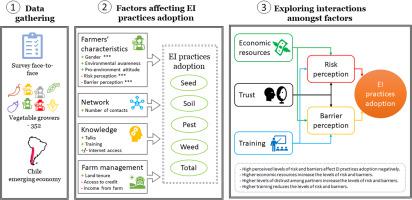Agricultural Systems ( IF 6.1 ) Pub Date : 2021-09-30 , DOI: 10.1016/j.agsy.2021.103283 Francisco Benitez-Altuna 1 , Jacques Trienekens 1 , Valentina C. Materia 1 , Jos Bijman 1

|
Context
Vegetable production is highly dependent on chemical fertilisers and pesticides, but the intensive use of these inputs negatively impacts the environment and human health. Ecological Intensification (EI) has the potential to counter the adverse effects of agricultural intensification and improve sustainability. Despite the potential benefits of EI for the environment, the adoption rate of EI in vegetable production is low. Moreover, most studies on EI adoption focus on implementing a single farming practice or a single production stage.
Objective
This article aims to empirically analyse what factors influence the simultaneous adoption of various EI practices in different vegetable crop production stages by farmers in the context of an emerging economy such as Chile. Further, since the literature on EI practices adoption mainly analyses these factors as separate from each other, we aim to explore the interactions between factors and how these jointly impact the application of EI practices.
Methods
We collected data via a survey to vegetable growers in the central zone in Chile. First, we measure EI practices adoption through a farm-level index that reflects the sustainability of farming practices in five production stages. Second, we identify which factors affect EI practices adoption through multiple linear regressions. Third, based on the results of the previous steps, we carried out a literature review to see how the factors predicting the adoption of EI could interact. This analysis was performed using structural equation modelling.
Results and conclusions
Our results show that being a woman, receiving training on EI practices, and being pro-environment positively affect EI practices adoption. Contrarily, obstacles include the perception of risk and barriers, better access to credit and higher income from farm activities, all of which negatively affect EI practices adoption. With reference to the interaction amongst the factors, we found that economic resources, trust and training are the major factors affecting the perception of risk and barriers amongst Chilean farmers when it comes to adopting EI practices.
Significance
Embracing a broad perspective, including different farming practices and production stages, allowed us to offer insights into the complex processes of adopting EI practices. Identifying which factors are important and how these factors interact with each other, contributes to the debate on whatpolicymakers and scholars need to focus in order to increase the use rate of EI practices.
中文翻译:

影响采用生态集约化做法的因素:智利蔬菜生产案例研究
语境
蔬菜生产高度依赖化肥和农药,但这些投入物的大量使用会对环境和人类健康产生负面影响。生态集约化 (EI) 有潜力抵消农业集约化的不利影响并提高可持续性。尽管EI对环境有潜在的好处,但EI在蔬菜生产中的采用率很低。此外,大多数关于 EI 采用的研究都集中在实施单一的农业实践或单一的生产阶段。
客观的
本文旨在实证分析在智利等新兴经济体的背景下,哪些因素会影响农民在不同蔬菜作物生产阶段同时采用各种 EI 实践。此外,由于关于 EI 实践采用的文献主要分析这些因素,我们的目标是探索因素之间的相互作用以及这些因素如何共同影响 EI 实践的应用。
方法
我们通过对智利中部地区蔬菜种植者的调查收集了数据。首先,我们通过反映五个生产阶段农业实践可持续性的农场级指数来衡量 EI 实践的采用情况。其次,我们通过多元线性回归确定哪些因素会影响 EI 实践的采用。第三,基于前面步骤的结果,我们进行了文献回顾,以了解预测采用 EI 的因素如何相互作用。该分析是使用结构方程模型进行的。
结果和结论
我们的结果表明,作为一名女性,接受 EI 实践培训,以及亲环境对 EI 实践的采用产生积极影响。相反,障碍包括对风险和障碍的感知、更好地获得信贷和农业活动的更高收入,所有这些都会对 EI 实践的采用产生负面影响。参考这些因素之间的相互作用,我们发现经济资源、信任和培训是影响智利农民在采用 EI 实践时对风险和障碍的看法的主要因素。
意义
拥抱广阔的视野,包括不同的农业实践和生产阶段,使我们能够深入了解采用 EI 实践的复杂过程。确定哪些因素是重要的,以及这些因素如何相互作用,有助于讨论政策制定者和学者需要关注什么才能提高 EI 实践的使用率。











































 京公网安备 11010802027423号
京公网安备 11010802027423号